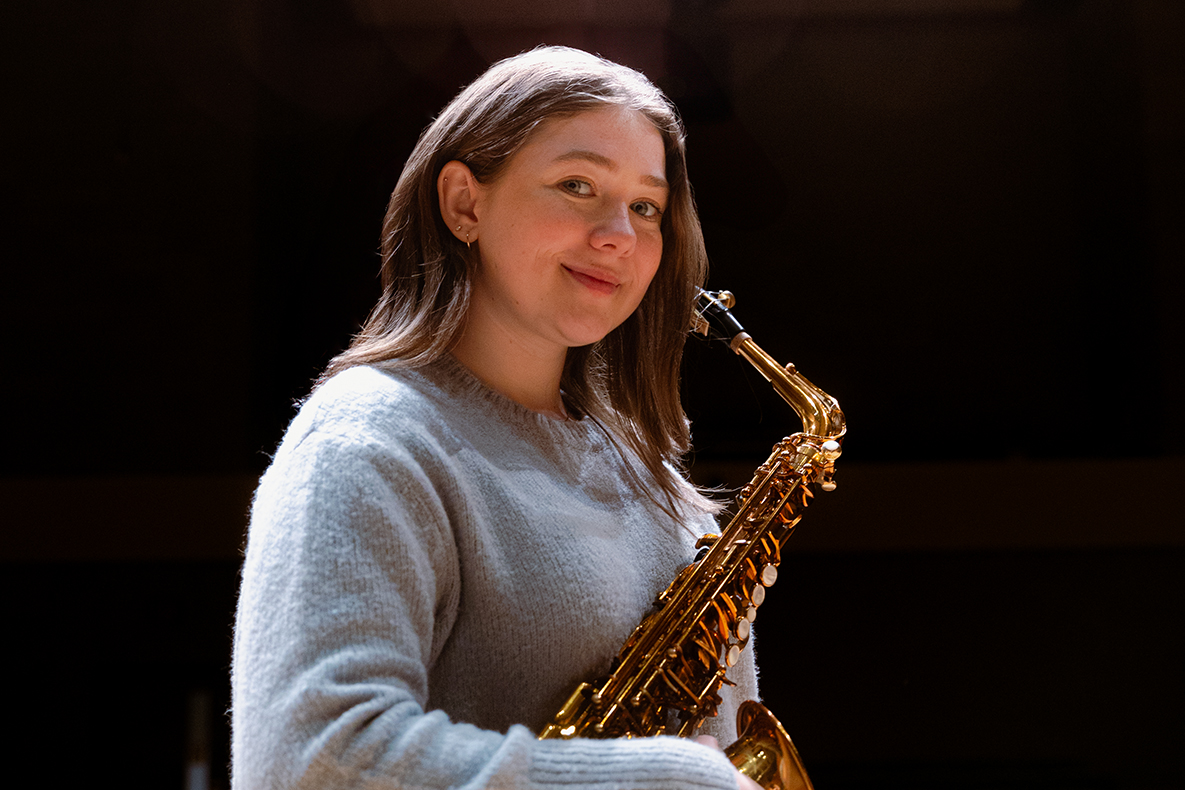Like many Iowa State students, Lydia Linch’s talents reach far and wide. She’s an award-winning saxophonist who has participated in numerous music events and activities throughout her tenure at Iowa State. But Linch also has a penchant for science, particularly in the fields of human health and neuroscience. Music and science may seem like uncommon academic partners, but Linch (’24 music, kinesiology) has found a way to meld the two together in perfect harmony.
Never say never
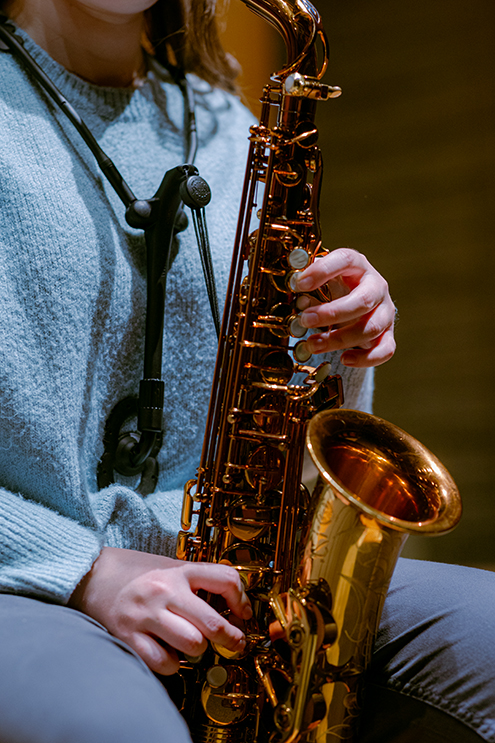
Linch, a native of Ames, Iowa, participated in countless band and choir activities during middle school and high school. Since 8th grade, she has been taking private saxophone lessons with Michael Giles, teaching professor of music and saxophone at Iowa State. Giles is from the same hometown as Linch’s father and a close family friend.
“Since 8th grade, he has been in my corner,” Linch said. “He’s awesome. I can go to him with whatever I need help with, and just talk things through with him. He’ll give it to me honestly. He’s been very supportive throughout everything, any choice I’ve made.”
With so much musical experience on her high school resume, Linch’s friends and family assumed she would pursue a music degree in college. But she had other ambitions.
“I knew I wanted to do something in the medical field, so I was always dead set on that, and I wasn’t going to do any music after high school,” Linch said. “I had been doing a ton of music stuff throughout high school for both choir and band. I just decided that I’m done with that.”
But Giles’ quiet persistence for Linch to attend Iowa State and major in music struck a chord with her.
“At first, I was conflicted because I wasn’t really planning on doing that. That didn’t seem like the path I was going to go on, but I decided to give it a try,” she said.
Major demands
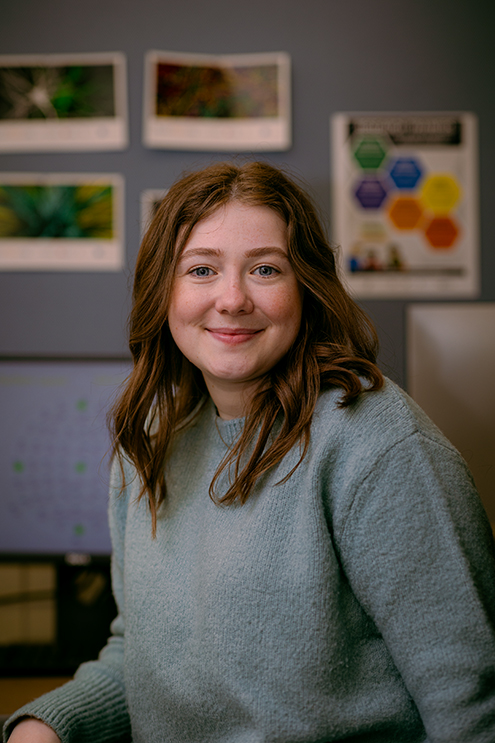
Linch began her college career as a music major, but her love of science never dissipated. Soon, she declared a second major in kinesiology with a focus on human medicine. Two demanding majors proved difficult at times, but Linch was up to the challenge.
“Lydia works incredibly hard in pursuit of both majors,” Giles said. “She demands a lot from herself and keeps high expectations. She has managed to meet her standard with remarkable consistency, becoming a standout saxophonist in our department while blazing her own trail in the sciences.”
Despite vowing to leave her musical experiences behind in high school, Linch has participated in several Iowa State music activities, including marching band, where she was captain of the saxophone section; Symphonic Band; Wind Ensemble; Ames Town and Gown Musicale; and Kappa Kappa Psi, an honorary band fraternity.
Linch’s most impactful musical experience at Iowa State occurred in the fall of 2022, when she stepped out of her comfort zone and competed in the annual Iowa State Solo Concerto Competition. After preparing a piece she selected to perform on her saxophone, Linch played for judges in two rounds before being chosen as one of the three winning musicians. She performed her piece for a full audience, accompanied by the Iowa State Symphony Orchestra, in the spring of 2023.
“Lydia works incredibly hard in pursuit of both majors. She demands a lot from herself and keeps high expectations. She has managed to meet her standard with remarkable consistency, becoming a standout saxophonist in our department while blazing her own trail in the sciences.”
Linch was pleased with the musical progress she made during the competition, but she was especially proud of her personal growth.
“The concerto competition was a big thing for me because I have very much struggled with being confident in my playing,” Linch said. “Just seeing the growth in myself has been really nice. It made me feel proud of myself.”
Musical medicine
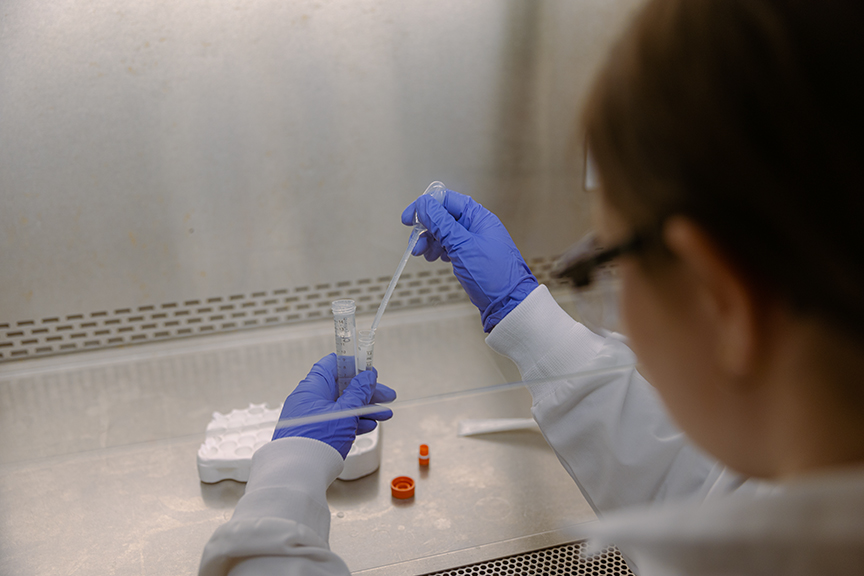
Linch admits that music and kinesiology may be an odd combination for some students, but it’s been a great fit for her, especially since she began doing undergraduate research alongside Elizabeth Stegemöller, associate professor of kinesiology. Stegemöller is the only music therapist in the nation with a Ph.D. in neuroscience. Her research uses novel therapies to improve the health of people with Parkinson’s disease.
Linch’s double majors in music and kinesiology are foundational for the research she conducts in Stegemöller’s lab. Currently, Linch is assisting with a nationally funded SPARX3 Phase 3 clinical trial, the first randomized control trial designed to investigate the effects of moderate- and high-intensity aerobic exercise on disease progression in untreated patients with Parkinson’s disease. Iowa State is one of 24 universities in the nation participating in the trial.
“What made Lydia stand out is that she took initiative. She approached me about her ideas and thoughts. Most undergrads jump on other projects and are great at helping existing projects. Lydia does help with many projects, but she went that next step and started asking about additional research questions.”
Linch took her research aspirations a step further this year by developing her own project. She seeks to understand the underlying neural mechanisms and biomarkers associated with listening to music. She wants to document whether music listening improves motor function in people with Parkinson’s disease.
“Dr. Stegemöller has helped me immensely with the project. It’s kind of what she focuses on with her own personal research, so it’s been awesome to collaborate with her,” Linch said. “She’s been an awesome resource.”
Stegemöller said Linch’s interest in developing her own research questions sets her apart from other students.
“What made Lydia stand out is that she took initiative,” Stegemöller said. “She approached me about her ideas and thoughts. Most undergrads jump on other projects and are great at helping existing projects. Lydia does help with many projects, but she went that next step and started asking about additional research questions.”
Research outside the lab
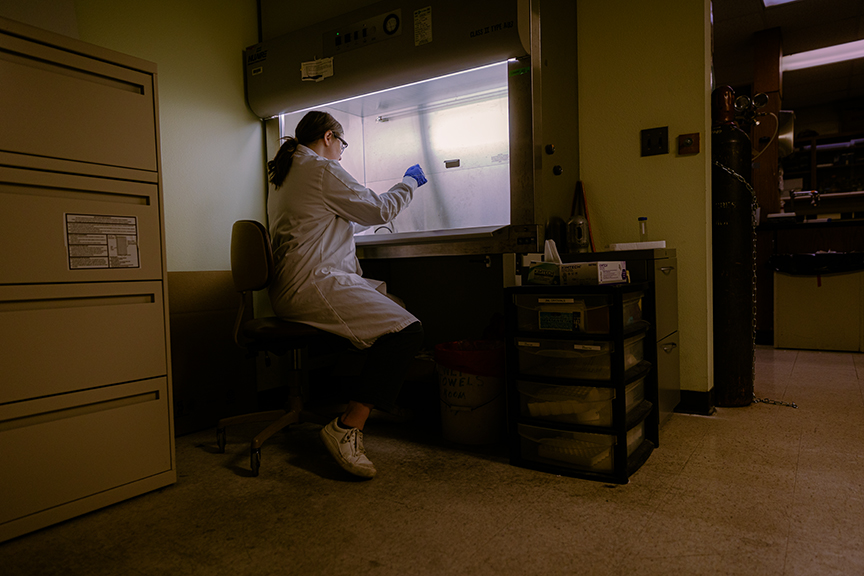
Several years ago, Stegemöller created therapy groups for individuals with Parkinson’s disease where she could put her research theories into practice. Each week, three different groups meet in Ames, one focused on singing, the second on dancing, and the third on boxing. Some people join one group; others participate in all three. Seeing firsthand the powerful impact of music on the outreach group participants excites Linch.
“They’ve found that sitting in a chair for one hour singing improves gait, improves tremor, improves swallowing, improves speech,” Linch said. “That’s really amazing!”
Linch recounts another awe-inspiring moment when she witnessed an individual, who was having difficulties navigating a ramp, alleviate his Parkinson’s disease symptoms by simply singing a song.
“Dr. Stegemöller walked up and said, ‘let’s sing ‘You are My Sunshine.’ They start singing and clapping and boom, he started walking down the ramp like he had little to no impairment at all.”
More work to be done
Moments like these have inspired Linch to earn a master’s degree in neuroscience at Iowa State, beginning the fall of 2024. She will continue working in Stegemöller’s lab, discovering new ways to use music to combat the effects of Parkinson’s disease. And of course, she will continue working with the outreach groups.
“It’s a great community. That’s one of the reasons I’m staying for my master’s,” Linch said. “I just don’t feel like I’m done helping this group of people yet. I really want to make a bigger impact and spend more time with them. I love all of them. They’re awesome.”
